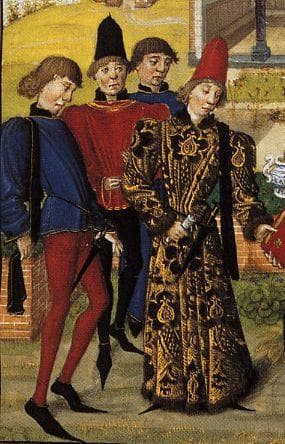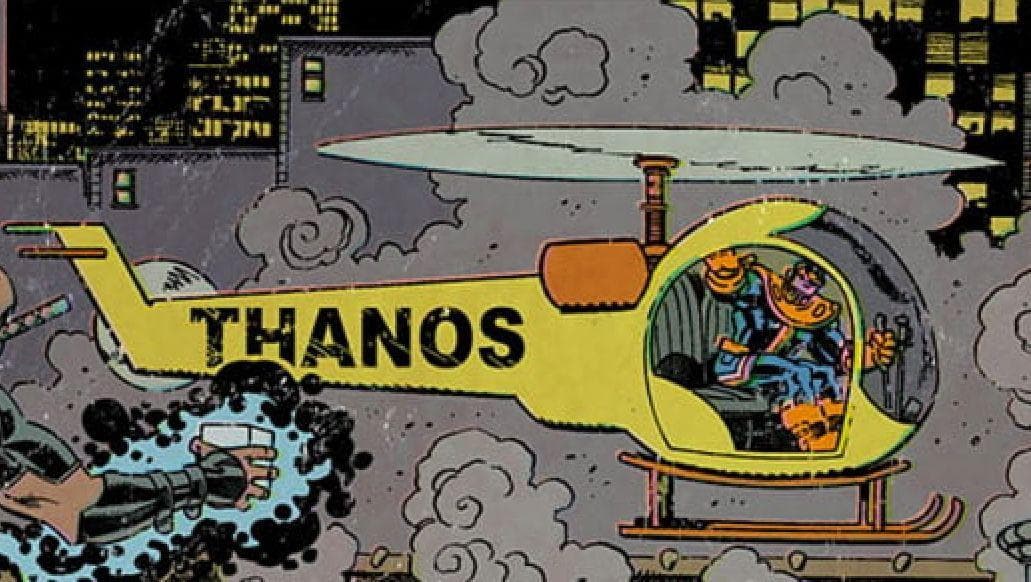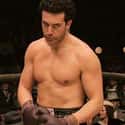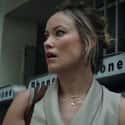-
(#1) Titanic
- Leonardo DiCaprio, Kate Winslet, Billy Zane, Kathy Bates, Frances Fisher, Gloria Stuart, Bill Paxton, Bernard Hill, Jonathan Hyde, Victor Garber, David Warner, Danny Nucci, Suzy Amis, Bernard Fox, Richard Fox, Emmett James
First Officer William Murdoch went down with the Titanic in 1912. He was in charge at the time the ship hit the iceberg and, according to witnesses, helped organize the loading of passengers into lifeboats on the starboard deck. As he left the boat, fellow officer Charles Lightoller claimed he specifically remembered seeing Murdoch helping passengers in that area and, since Murdoch was never seen again, it was assumed he went down with the ship.
In the 1997 film Titanic, possibly to heighten the tension onboard the ship as it sinks, director James Cameron chose to include a scene in which Murdoch accepts hush money to allow a passenger onto a lifeboat. Later, he fires a gun into the crowd, then turns the piece on himself to take his own life.
Although a few witnesses claimed to have heard pistol shots after leaving the ship, and several claimed to have seen an officer fire at a few passengers to control the crowd, none of these accounts mention Murdoch. At official inquiries into the disaster, however, witnesses said nothing about arms. An officer firing shots at passengers before taking his life was an unsubstantiated legend until Cameron decided to include the alleged scene in his film and make Murdoch the shooter.
For Murdoch's nephew, Scott, Cameron's decision to include a rumor over facts was hurtful. "From my own family connections and also from my father having spoken to various officers who survived, he didn't commit suicide," he said. "If someone says to you somebody in the family committed suicide when he hadn't, you take objection."
The Murdoch family reportedly contacted Cameron twice before the movie's release to voice their complaints, but they went unheard. After the movie's release, Cameron finally confronted their objections by making an official apology for his depiction of Murdoch:
I think I have come to the realization that it was probably wrong to portray a specific person, in this case First Officer Murdoch, as the one who fired the weapon. First Officer Murdoch has a family and they took exception to that, and I think rightly so.
-
(#2) Green Book
- Viggo Mortensen, Mahershala Ali, Linda Cardellini, Sebastian Maniscalco, Dimiter D. Marinov, Mike Hatton, P.J. Byrne, Joe Cortese, Maggie Nixon, Von Lewis, Jon Sortland, Don Stark, Anthony Mangano, Paul Sloan, Quinn Duffy, Seth Hurwitz, Hudson Galloway, Gavin Lyle Foley
Although Green Book received criticism after it won the Best Picture Oscar for depicting a "white savior" character, even more criticism came from the protagonist's real family, who claim the movie's story was entirely made up.
Green Book depicts Black musician Dr. Donald W. Shirley (Mahershala Ali) as he travels through the Jim Crow South with his white chauffeur Tony Vallelonga (Viggo Mortensen). Throughout the movie, Vallelonga teaches Shirley how to connect with the Black community, embrace Black music, and eat fried chicken. It implies Shirley had no contact with his family, and he and Vallelonga forged a strong friendship. The movie was co-written by Nick Vallelonga, son of Tony, who most likely believed this plot to be accurate from his perspective. For Shirley's family, however, the film was entirely fictional and painful to watch.
According to Shirley's brother Maurice, the musician "had three living brothers with whom he was always in contact... There wasn't a month where I didn't have a phone call conversation with Donald." Maurice claimed the movie's events were even further skewed by the fact Shirley and Vallelonga never shared anything resembling a friendship. "He fired Tony!" Maurice added.
"It was an employer-employee relationship," Maurice's wife, Patricia, said.
For Shirley's niece, Carol, the movie was "a depiction of a white man's version of a Black man's life... to depict him as less than... and make the story about a hero of a white man for this incredibly accomplished Black man is insulting, at best."
To make matters worse, Shirley's nephew, Edwin, claims his uncle never wanted a movie made about him and turned down requests decades ago. Although Nick and director Peter Farrelly insist the film is accurate and truthful, Ali reportedly called Shirley's family to apologize, saying, "If I have offended you, I am so, so terribly sorry. I did the best I could with the material I had. I was not aware that there were close relatives..."
-
(#3) Cinderella Man
- Russell Crowe, Renée Zellweger, Paul Giamatti, Craig Bierko, Paddy Considine, Bruce McGill, Ron Canada, David Huband, Connor Price, Ariel Waller, Patrick Louis, Rosemarie DeWitt, Linda Kash, Nicholas Campbell, Gene Pyrz, Matthew G. Taylor, Jake Richards, Fulvio Cecere, Duff MacDonald
The climax of 2005's Cinderella Man features protagonist James J. Braddock (Russell Crowe) fighting and beating Max Baer (Craig Bierko) to become heavyweight champion. While this is an accurate portrayal of what happened in reality, Baer's son Max Baer Jr. took offense at director Ron Howard's depiction of his father.
In the movie, Baer is mean, bloodthirsty, and feels no shame about telling Braddock's wife he'll finish off her husband and then take her as his own wife. Baer Jr. claimed his father's personality was very different than that seen in the movie and was offended he had been turned into a villain. "I have great respect for Ronny Howard," Baer Jr. said. "But he never called me for any factual information about my father. They distorted his character. They didn't have to make him an ogre to make Jimmy Braddock a hero."
Although the film accurately shows Baer wearing a Star of David on his boxing trunks, Baer also took offense to the movie failing to mention he did so to show solidarity with Jewish boxing fans in New York. Many members of the Jewish community believed Baer to be a hero after he fought and beat Max Schmeling, the pride of the Third Reich.
In the movie, Baer brags about how he killed boxer Frankie Campbell in the ring, which helps cement him as the film's swaggering, hateable villain. But that incident was actually hugely traumatic for Baer.
"My father cried about what happened to Frankie Campbell," Baer Jr. remembered. "He had nightmares. He helped put Frankie's children through college."
Others backed up Baer Jr.'s claims about his father's personality, often referring to him as "lovable clown." Lightweight champ Tommy Loughran recalled, "Max was the most misunderstood fighter of them all. He was the nicest guy. He had the heart of a lion."
-
(#4) Walk the Line
- Joaquin Phoenix, Reese Witherspoon, Ginnifer Goodwin, Robert Patrick, Dallas Roberts, Dan John Miller, Larry Bagby, Shelby Lynne, Tyler Hilton, Waylon Payne, Shooter Jennings, Dan Beene, Lucas Till, Ridge Canipe, Brad Birkedahl
Before Johnny Cash met and furthered his country music stardom with June Carter, he was married to Vivian Liberto Distin. Considering her importance to Cash's life and story, she is depicted in Walk the Line, although the film focuses on Cash and Carter's relationship.
For Kathy Cash, daughter of Cash and Distin, the movie was hurtful. Kathy objected to the film's depiction of her mother and believed it reduced her to a narrative element meant to propel Cash's career forward. "My mom was basically a nonentity in the entire film except for the mad little psycho who hated his career," she said.
Kathy claimed that, in reality, "[Distin] loved his career and was proud of him until he started taking [substances] and stopped coming home." She apparently didn't hold a grudge against the film, however, as she also claimed to have believed the performances of Reese Witherspoon and Joaquin Phoenix were well done and the overall movie positive.
Despite these claims, Kathy allegedly made several attempts to watch the film at a special family screening, but walked out five times.
-
(#5) Once Upon a Time in Hollywood
- Leonardo DiCaprio, Brad Pitt, Margot Robbie, Kurt Russell, Dakota Fanning, Damon Herriman, Austin Butler, Emile Hirsch, Scoot McNairy, Luke Perry, Al Pacino, Nicholas Hammond, Spencer Garrett, Mike Moh, Lena Dunham, Damian Lewis, Bruce Dern, Timothy Olyphant, Zoe Bell, Michael Madsen, James Remar, Brenda Vaccaro, Margaret Qualley, Julia Butters, Samantha Robinson, Lorenza Izzo, Costa Ronin, Rumer Willis, Rafał Zawierucha, Clifton Collins, Keith Jefferson, Maya Hawke, Sydney Sweeney, Dreama Walker, Victoria Pedretti, Madisen Beaty
In Once Upon a Time in Hollywood, director Quentin Tarantino recreated 1960s tinsel town for a fictional story that also includes depictions of real people. Martial art film star Bruce Lee is among these (played by Mike Moh) and fights stuntman protagonist Cliff Booth (Brad Pitt), who throws Lee into the side of a car.
According to Lee's daughter, Shannon, the personality of the character in the film is nothing like her father. She claims, "He comes across as an arrogant *sshole who was full of hot air and not someone who had to fight triple as hard as any of those people did to accomplish what was naturally given to so many others."
In real life, Lee was born in America and grew up in Hong Kong before returning to America to teach martial arts and appear in films. He had to fight for his first role on TV's The Green Hornet, was paid less for his work, and received fewer lines because of his race. It's this time period that's depicted in the movie.
According to Shannon:
I can understand all the reasoning behind what is portrayed in the movie. I understand that the two characters are antiheroes and this is sort of like a rage fantasy of what would happen... and they're portraying a period of time that clearly had a lot of racism and exclusion. I understand they want to make the Brad Pitt character this super bad-*ss who could beat up Bruce Lee. But they didn't need to treat him in the way that white Hollywood did when he was alive.
Not only did Shannon object to Tarantino's depiction of her father, but so did basketball legend and Lee's Game of Death co-star Kareem Abdul-Jabbar. "Tarantino has the artistic right to portray Bruce any way he wants, but to do so in such a sloppy and somewhat racist way is a failure both as an artist and as a human being," he said. "That's what makes the Bruce Lee scenes so disappointing, not so much on a factual basis, but as a lapse of cultural awareness."
China has agreed with these claims and, after Shannon voiced complaints to the country's National Film Administration, it asked Tarantino to make cuts to the scene featuring Lee to make his depiction less insulting. When the director said no, China refused to release the film in their country.
-
(#6) Kathy Scruggs's Colleagues Were Furious About Her Indecent Proposal In 'Richard Jewell'
Clint Eastwood’s film Richard Jewell professes to tell the true story of a security guard whose life-saving actions during the 1996 Atlanta Olympic Park bombing resulted in Jewell being investigated by the FBI and having his life upended in a public firestorm. Ironically, however, the Atlanta Journal-Constitution ended up blasting the film for its defamation of Kathy Scruggs, a real-life AJC reporter, claiming she was unfairly maligned by the film’s loose interpretation of her character.
In the film, Scruggs (Olivia Wilde) makes an indecent proposal to an FBI agent (Jon Hamm) in exchange for landing a scoop, an event which, according to the AJC (and not directly disputed by Warner Bros.), never actually happened. Kevin Riley, an editor at the AJC, called it “lazy storytelling” and proclaimed “it was very upsetting to see Kathy Scruggs portrayed in a way that demeans not just her work, but the work of the AJC.”
Ron Martz, Scruggs’s longtime colleague at the paper, added, “If they had actually contacted me it might have ruined their idea of what they wanted the story to be.”
An attorney for the paper pointed out, “It is highly ironic that a film purporting to tell a tragic story of how the reputation of an FBI suspect was grievously tarnished appears bent on a path to severely tarnish the reputation of the AJC.”
Warner Bros. responded that the film was “based on a wide range of highly credible source material.” The movie also ends with the disclaimer, “The film is based on actual historical events. Dialogue and certain events and characters contained in the film were created for the purposes of dramatization.”
Wilde passionately defended her portrayal of Scruggs, claiming, “I did a ton of research, I really embraced her dynamic, multidimensional nuanced personality,” and “I think it’s a shame that she has been reduced to one inferred moment in the film.”
-
(#7) Wired
- Michael Chiklis, J. T. Walsh, Alex Rocco, Ray Sharkey, Patti D'Arbanville, Lucinda Jenney, Jere Burns
When Bob Woodward wrote the John Belushi biography Wired in 1984, many thought the legendary reporter who helped uncover Watergate would shed new light on the comedian's life. However, when the book was released, both Belushi's family and friends spoke out against the inhuman character Woodward presented in his work.
Members of Belushi's family were so angry, John's brother, Jim, even called Woodward a "c*cksucker." Belushi's wife, Judy, originally hired Woodward to write the book, since she valued his investigative skills and thought he might uncover any hidden facts about the way the police handled her husband's passing. Despite her intentions, Belushi's family and friends accused the book of focusing on his problems with substances and not bothering to examine the talented man behind them.
"I hated Woodward's book because I don't believe he made an honest attempt to understand John, who despite his sometimes gruff exterior was a gentle soul," fellow comedian Al Franken said.
When Woodward's book was made into a film in 1989, the criticism continued. Despite the negative feedback received, bidding rights for the book reportedly reached $2 million. Filmmakers cast the then-unknown Michael Chiklis as Belushi, and the film opens with him waking up in the morgue and running around naked, screaming.
It becomes a sort of meta-tale as it includes Woodward's investigation, gives Belushi a guardian angel friend, and depicts the comedian as a casual bigot. Although it probably has nothing to do with the book's criticism and was judged by its own failures, the movie has a 4% critic rating on Rotten Tomatoes.
Dan Aykroyd called the book "exploitation, pulp trash," and Judy claimed, "The man in Wired is not the man I knew... He was a very likable person. He had a terrific presence, and Woodward missed all that."
-
(#8) The Theory of Everything
- Eddie Redmayne, Felicity Jones, Emily Watson, David Thewlis, Charlie Cox, Simon McBurney, Maxine Peake, Charlotte Hope, Tom Prior, Enzo Cilenti, Gruffudd Glyn
Physicist Stephen Hawking's first wife, Jane, wrote about their life together in her memoir, Traveling to Infinity. Director James Marsh later used the book as source material for his 2014 film, The Theory of Everything.
Jane claims she asked Marsh to be faithful to the events depicted in the book, but soon learned the filmmakers had taken liberties with their story, most likely due to the limitaitons of its runtime. "I knew if there were mistakes in the film that they were going to be immortalized, which they have been," Jane recalls.
The movie includes her relationship and marriage with Hawking over a span of 30 years, but Jane claims it glosses over the events, and thus makes her feelings during the time period meaningless.
She remembers:
I'm sorry to say that none of these extensive travels - with all the organizing, packing for a family with a severely disabled member, transporting them, driving them, as well as the usual day-to-day care - really appears in The Theory of Everything. I asked for a frenzied fast-forward version - even simply getting all the suitcases, wheelchair and passengers in the car to represent this aspect of our lives - but I was told this was not possible because of the time constraints.
Jane also alleges the movie glosses over the fact she gave up her own career to take care of her husband, depicting the couple parting ways in a clean and respectful manner - unlike the angry fight she describes in her book, full of screaming and bitter tears.
"Don't ever believe what you see in films," Jane told attendees of the Henley Literary Festival.
-
(#9) The Buddy Holly Story
- Gary Busey, Don Stroud, Charles Martin Smith, William Jordan, Maria Richwine, Conrad Janis, Albert Popwell, Amy Johnston, Jim Beach, John F. Goff, Fred Travalena, Dick O'Neil, Stymie Beard, M.G. Kelly, Paul Mooney, Bill Phillips Murray, Freeman King, Steve Camp, Jody Berry, Robert Christopher, Arch Johnson, Neva Patterson
Executive producer Ed Cohen had many excuses for Buddy Holly's family and friends being upset at his depiction in The Buddy Holly Story, from budget and time constraints to the fact movies can invent their own reality.
"Whatever we put up there on the screen will be the truth," Cohen said. "Ask moviegoers who invented the telephone. They'll tell you that Don Ameche did." This is a reference to the actor, who once played Alexander Graham Bell.
The Buddy Holly Story is based on a book by John Goldrosen, which is not considered an official biography and, according to original Cricket Jerry Allison, the movie got basic facts incorrect. Allison says that the movie suggests the Crickets was a 12-person band when, in fact, "there weren't 12 Crickets during Buddy's [entire] career."
The movie also shows Holly playing with a full orchestra on his final tour when, in reality, he only recruited three people. The film also implies Holly wrote all his music himself without any help and completely omits Norman Petty, a producer who greatly helped Holly's career.
Holly's family was hurt by the film's implication they held no importance to Holly. "We were disappointed by the movie because it wasn't what we thought it was going to be," Holly's mother, Ella, said. "That church scene [where Buddy and rock and roll are condemned from the pulpit] could never have happened. Buddy was close to his pastor, the Reverend Ben Johnson, and he was a member of the Tabernacle Baptist Church."
While the movie depicts Holly's family as against his musical career and constantly telling him to quit, Holly's parents said this was untrue. "We were behind Buddy 100%," his father recalls. "We were very anxious for him to make a career as a singer. We were his biggest fans."
Although the filmmakers told the family they'd be able to view the script before filming, the filmmakers allegedly never followed through. "They didn't ask us about a thing," Holly's brother Larry claims. "I didn't feel that was my brother up there on the screen. We weren't happy with the movie at all."
-
(#10) The Doors
- Val Kilmer, Meg Ryan, Kevin Dillon, Kyle MacLachlan, Frank Whaley, Michael Madsen, Kathleen Quinlan, Michael Wincott, Dennis Burkley, Josh Evans, Paul Williams, Christina Fulton, Crispin Glover, Billy Idol, Charlie Spradling
Reactions from the real Doors members to the depiction of themselves and Jim Morrison in Oliver Stone's 1991 movie, The Doors, vary. Both drummer John Densmore and keyboardist Ray Manzarek realized Stone took liberties with events and sometimes made things more cinematically dramatic.
"I didn't remember all those naked girls running on stage," Densmore said. "If that had happened, I would have stopped playing, my God, and started a relationship!" He shrugged off any conflict with Stone's interpretation, calling the movie "a beautiful impressionistic painting of the times."
Manzarek, however, took offense at the altered facts. "Jim didn't light Pam's closet on fire," he said. "He didn't throw a TV set at me... Jim never quit film school. He graduated from UCLA."
Manzarek felt the movie got Morrison's character wrong. "The film portrays Jim as a violent, drunken fool," he said. "That wasn't Jim. When I walked out of the movie, I thought, 'Geez, who was that jerk?'"
Densmore pointed out the studio denied former film student Manzarek from directing the movie, possibly leading to Manzarek's negative reaction. "Ray was on Oliver so much that I don't know if he was allowed on the set for a while," he remembered. "He was trying to tell Oliver how to make the movie. Mainly Ray wanted it to be about none of the darker side of Jim. Well, that's ludicrous."
Manzarek felt the movie focusing on Morrison's problems detracts from the band's message. "The Doors were about idealism and the '60s' quest for freedom and brotherhood," Manzarek said. "But the film isn't based on love. It's based in madness and chaos. Oliver has made Jim into an agent of destruction."
-
(#11) Nina Simone's Family Was Not Happy About Zoe Saldana Being Cast In 'Nina'
In order to play legendary singer and civil rights activist Nina Simone in Nina, Dominican and Puerto Rican actress Zoe Saldana made her face darker and wore a prosthetic that flattened her nose.
For Simone's daughter Simone Kelly, this echoed a painful reality in her mother's life. "My mother was raised at a time when she was told her nose was too wide, her skin was too dark," Kelly said. "Appearance-wise this is not the best choice."
Saldana defended her acceptance of the role, saying, "It's more complex than just 'Oh, you chose the Halle Berry look-alike to play a dark, strikingly beautiful, iconic Black woman.' The truth is, they chose an artist who was willing to sacrifice herself. We needed to tell her story because she deserves it."
Simone's family, however, refused to stop their complaints and repeatedly tweeted angry responses to the movie's trailer. Their backlash against Saldana continued after she tweeted the Simone quote: "I'll show you what freedom is to me - No Fear... I mean, really, no fear."
The family responded, "Cool story but please take Nina's name out your mouth. For the rest of your life."
-
(#12) Aaliyah: The Princess of R&B
The Lifetime channel often makes biographical made-for-TV movies that examine the lives of figures from popular culture, but it has a nasty history of disappointing its subjects' friends and family. Pat Houston railed against a Lifetime film about her sister-in-law, Whitney, by writing, "If you watch this movie, watch it knowing that Lifetime is notorious for making bad biopics of deceased celebrities and brace yourself for the worst."
In 2014, R&B star Aaliyah joined Lifetime's infamously bad biopics, leading her family to speak out against the movie. Aaliyah's cousin, Jomo Hankerson, took offense that Lifetime failed to reach out to the family before announcing the movie's production and based their story on a biographical book written by Christopher Farley rather than the memories of those who knew her.
Hankerson recalled:
If this were 50 years from now and nobody was here, then okay, you can just use research, but people are here. So why not have conversations with the people, because they're here, especially when you're saying the word biopic and you're telling her story... I helped create the story. I was there for the story. Me and my dad weren't just bystanders, we put out every record she ever recorded. It's strange to not have that conversation with us.
Hankerson also felt Aaliyah's story deserved a bigger treatment - one that only the big screen could provide. He added, "Is it really honoring Aaliyah to have someone else record her songs? Is it really honoring Aaliyah to do a movie where you know you didn't turn over every stone to make sure everything is accurate?"
-
(#13) Tolkien
- Nicholas Hoult, Lily Collins, Colm Meaney, Derek Jacobi, Anthony Boyle, Patrick Gibson, Tom Glynn-Carney, Craig Roberts, Harry Gilby, Adam Bregman, Albie Marber, Ty Tennant, Laura Donnelly, Genevieve O'Reilly, Pam Ferris
Born on January 3, 1892, J.R.R. Tolkien served in World War I and became a university professor before gaining widespread acclaim as a fantasy author with works that include The Hobbit and The Lord of the Rings. In 2019, filmmakers decided to make a film about Tolkien's life. Starring Nicholas Hoult in the title role, Tolkien depicts "the formative years of the renowned author's life as he finds friendship, courage and inspiration among a fellow group of writers and artists at school," according to the studio.
While the author's fans may have looked forward to the film, the Tolkien estate was less than thrilled. "The family of J.R.R. Tolkien and the Tolkien Estate are aware of the Fox Searchlight motion picture entitled Tolkien that is due for release in May 2019," his family declared. "The family and the Estate wish to make clear that they did not approve of, authorize, or participate in the making of the film. They do not endorse it or its content in any way."
Despite the Tolkien family's stance, the movie studio stood their ground. "We are so proud of Dome Karukoski's film Tolkien, which focuses on the early years of J.R.R. Tolkien's extraordinary life and does not depict subject matter from his novels," Fox Searchlight wrote in a statement. "While we did not work with the Tolkien Estate on this project, the filmmaking team has the utmost respect and admiration for Mr. Tolkien and his phenomenal contribution to literature."
Protective of their father's legacy, the Tolkiens also sued Warner Bros. for copyright infringement in 2017, claiming digital merchandising for the Lord of the Rings films harms Tolkien's name.
-
(#14) Grace of Monaco
- Nicole Kidman, Tim Roth, Paz Vega, Parker Posey, Milo Ventimiglia, Frank Langella, Derek Jacobi, Robert Lindsay, Geraldine Somerville, Jeanne Balibar, Roger Ashton-Griffiths, Nicholas Farrell, Olivier Rabourdin, André Penvern, Pascaline Crêvecoeur
Grace Kelly was a Hollywood star seen in classics like High Noon and Rear Window before she married Prince Rainier III of Monaco in 1956 and retired from acting. This transition in her life became the focus of the 2014 film Grace of Monaco, which stars Nicole Kidman as Kelly.
Not only did producers and director Olivier Dahan publicly fight about the movie, but the royal family of Monaco spoke out against it. "The Princely family does not in any way wish to be associated with this film which reflects no reality and regrets that its history has been misappropriated for purely commercial purposes," they said.
The family claimed their attempts to correct errors in the script were ignored and the trailer for the film "appears to be a farce and confirms the totally fictional nature of this film."
Both Kidman and Dahan brushed off the royal family's claims, insisting the movie was meant to be a work of fiction. "This is not a biopic or a fictionalized documentary of Grace Kelly, but only a small part of her life where she reveals her great humanity as well as her fears, and weaknesses," Kidman said.
"I am an artist," Dahan said, addressing the family's concerns. "I understand their point of view. After all, it is their mother. I do not want to provoke anyone. Only to say that it's cinema."
The family may have felt satisfaction with the film's ultimate fate. After flopping at the Cannes Film Festival, the movie had so many problems that it ended up airing on Lifetime rather than in movie theaters. Original screenwriter Arash Amel was so displeased with what had been done to his work, he live-tweeted throughout the broadcast, writing gems like, "The whole tone of this movie was for some reason Vertigo. Which Grace Kelly was never in."
New Random Displays Display All By Ranking
About This Tool
Our data comes from Ranker, If you want to participate in the ranking of items displayed on this page, please click here.
























